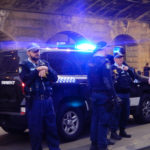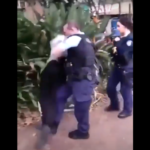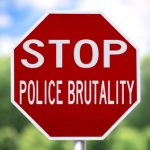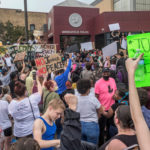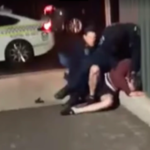NSW Police Officer Charged with Assaulting Teenager
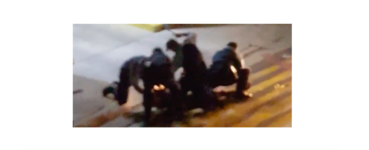
A New South Wales Police Officer who struck a naked teenager 18 times with a baton after he had already been capsicum sprayed and tasered, and was on the ground, is now facing criminal charges.
Officer Michial Greenhalgh has pleaded not guilty to one charge of common assault over the arrest – the remaining three officers were cleared of any wrongdoing – after an inquiry by the Law Enforcement Conduct Commission (LECC) in 2018.
The LECC inquiry began after footage taken by bystanders showed officers using excessive force during the arrest of the young man.
Police had responded to reports of a young man naked, in an alleyway in the holiday town in the early hours of the morning calling for help and water.
Shocking video footage showed police officers using capsicum spray, tasers and beating the boy repeatedly with a baton, while he lay on the ground, pleading for them to stop.
The LECC also heard that the boy, who cannot be named for legal reasons, and was only 16 years old at the time of the incident, has Asperger Syndrome, and after dinner with his parents, he went for a walk on his own and ended up in the alleyway disoriented and without clothing.
While police originally testified to the LECC that the boy was ‘unpredictable,’ and appeared to be under the influence of drugs, to justify their actions during his arrest, the LECC’s ultimate finding was that one officer, who assaulted the boy sixteen times with a baton, could be charged for using “grossly excessive force.”
Officer pleads ‘not guilty’ to assault charge
The case is currently before Lismore Local Court.
One witness has told the court he heard a police officer say to a group of bystanders: “you better not have fucking recorded this.” Other witnesses have testified that while the young man certainly appeared to be distressed, he did not seem violent or aggressive.
The court has also seen video footage of the arrest, during which the young man can be heard yelling, “Help. Please, God, I need water. I’m not resisting”, while being restrained on the ground.
The young man himself, who is now 19, has also testified, telling the court he accepted a beer from a group of slightly older boys who were drinking in a local park, and after drinking it “everything getting very bright and colourful” and his heart “started to race”.
He said he started to sweat profusely and began looking for water.
After his arrest, the boy was taken to Tweed Head Hospital and was found to have a fractured rib and extensive bruising on his limbs and torso.
The officer, Michial Greenhalgh, has pleaded not guilty to the charge which relates to the last six baton strikes.
Police must be made accountable for their actions
This is an important case for police accountability. While police continually do come up against people who are affected by drugs and alcohol and need to be aware of their own safety, and often need to make split-second decisions in tense situations, increasingly, we’re hearing reports of police acting with aggression first, then asking questions later.
We are also seeing an increase in excessive force used by police officers during arrests, and ‘mob policing’ – when groups of officers become involved in the arrest of a single person.
Such as the recent arrest of NRL star Curtis Scott. Twelve police officers were involved in his arrest. Footage showed Mr Scott being tasered and capsicum-sprayed, as well as being handcuffed while he was lying under a tree, heavily intoxicated and barely conscious.
The Downing Centre Local Court dismissed all the criminal charges police had laid against him, against him and his legal team is now considering launching a civil suit against NSW Police not just for the unlawful arrest of Mr Scott, but for the use of ‘unnecessary and unreasonable’ force during the arrest.
Cases of police brutality have in the past been difficult to pursue, but now that most people carry a smartphone, and CCTV surveillance is prevalent in most towns and cities, which means that in many cases video footage is available to provide evidence in situations where people have been mistreated or unlawfully arrested.
Is it legal to film police in NSW?
In New South Wales, members of the public do “have the right to take photographs of or film police officers, and incidents involving police officers, which are observable from a public space, or from a privately owned place with the consent of the owner/occupier”.
However, it is important for those who are filming to stand out of the way of police officers, so as not to prevent them from doing their duty. Otherwise, a person could potentially be charged with the offence of hindering police under section 546C of the Crimes Act 1900 (NSW), which carries a maximum penalty of 12 months imprisonment, and/or a fine of $1,100.
The policy of the NSW Police Force makes clear to members of the force that an officer does not have the power to prevent filming or the taking of photographs, nor can they confiscate photographic equipment, delete images or recordings, or order the person who’s taken footage or photos to delete them.
An exception to this general rule, however, is where police suspect that a phone contains evidence of the commission of an offence.



